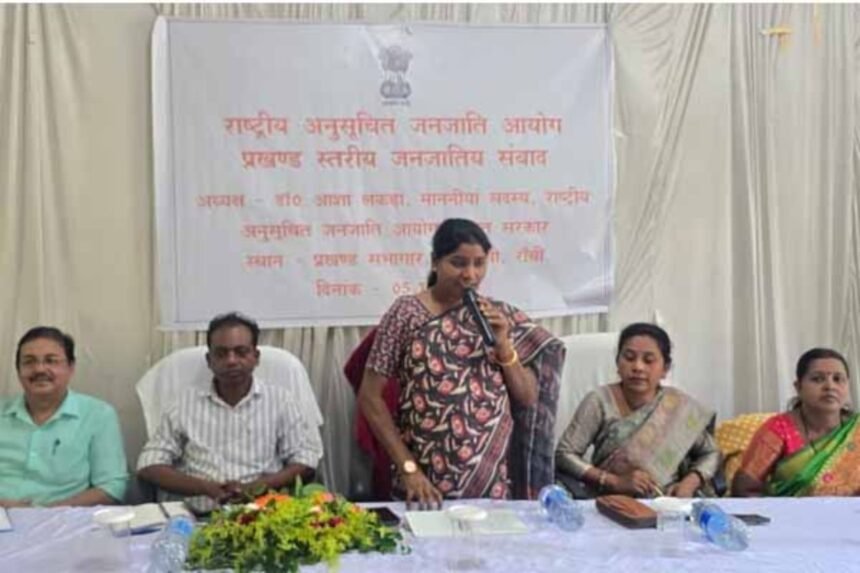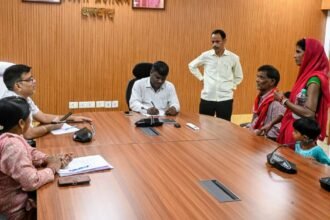Ranchi, October 5: On her recent visit to Ormanjhi block, Dr. Asha Lakra, a member of the National Commission for Scheduled Tribes, engaged with local villagers to assess their access to government schemes.
This visit was part of a broader initiative to evaluate how well the tribal population in Jharkhand is benefiting from central and state welfare programs.
The interaction, held on 05-10-2024, was designed to gather firsthand insights from the community regarding the implementation of government schemes like the PM Awas Yojana, pension schemes and other welfare initiatives aimed at the upliftment of marginalized communities.
Dr. Lakra’s primary objective during this visit was to understand the ground realities in the village and ensure that the intended beneficiaries of these schemes were not being overlooked.
As the political and social landscape of Jharkhand gears up for forthcoming elections, the conversation took on an added significance, with villagers raising critical issues around the effectiveness of these programs.
Details of the Interaction
During her interaction with the villagers, Dr. Asha Lakra took a direct approach, asking, “Are you benefiting from the government schemes meant for your welfare?”
This simple yet powerful question underscored the purpose of her visit – to ensure transparency in the delivery of government services to the tribal communities.
The villagers responded with a mix of gratitude and concerns. While some acknowledged the efforts of the government, many raised pressing issues.
According to several attendees, there were gaps in the implementation of various schemes, particularly in relation to essential services such as water supply and land disputes.
Dr. Lakra’s visit was crucial in bringing these grievances to light, providing a platform for villagers to speak openly about their experiences with government programs.
Key Issues Raised by Villagers
The villagers’ concerns during Dr. Lakra’s visit highlighted significant gaps in the effectiveness of government schemes. Several key issues were raised:
- Water Supply: The most frequently mentioned problem was the lack of access to clean and consistent water. Villagers expressed frustration at the absence of proper water infrastructure, which has severely affected their quality of life. Despite the government’s promises to improve water supply under various schemes, the reality on the ground appears to be far from satisfactory.
- Land-Related Disputes: Another major issue brought to light was land-related conflicts. Villagers spoke of ongoing disputes over land ownership and the government’s failure to address these grievances effectively. The lack of clear titles has caused delays in receiving benefits, such as housing under the PM Awas Yojana.
- Fencing of Masna and Sarna Sites: The lack of fencing around the tribal religious sites, Masna and Sarna, was another concern raised during the dialogue. These sites hold great cultural significance for the tribal population, and the community has long been demanding proper fencing to protect them. However, despite repeated requests, the issue remains unresolved.
- Pension Schemes and PM Awas Yojana: While the government has been promoting welfare schemes like the PM Awas Yojana and pension programs for elderly and disadvantaged communities, villagers revealed that several eligible beneficiaries were not listed in the scheme databases. This administrative oversight has led to growing resentment among those who rely on these programs for their livelihoods.
These concerns reflect the disconnect between the government’s welfare policies and their on-ground implementation.
Dr. Lakra’s inquiry into these issues suggests a broader need for improved communication between local authorities and villagers.
Response from Authorities
In response to the concerns raised by the villagers, Dr. Asha Lakra assured them that these issues would be taken up with higher authorities.
She emphasized that the National Commission for Scheduled Tribes is committed to safeguarding the rights of the tribal population and ensuring they receive the full benefits of government schemes.
Dr. Lakra noted that the delays and shortcomings in the implementation of these schemes were likely due to administrative inefficiencies rather than a lack of intent from the government.
She pledged to follow up with the relevant departments to expedite the resolution of water supply issues and land-related disputes, and ensure that religious sites like Masna and Sarna receive the necessary fencing.
Bigger Picture Context
The National Commission for Scheduled Tribes plays a crucial role in monitoring the welfare of tribal communities in India.
Established under the provisions of Article 338A of the Indian Constitution, the Commission works to protect and promote the interests of Scheduled Tribes by ensuring that welfare schemes are implemented effectively.
The government has launched numerous programs, such as the PM Awas Yojana, National Social Assistance Program, and MGNREGA, to uplift the tribal population and improve their access to basic services.
However, despite these efforts, the gap between policy and practice often results in limited benefits for the intended recipients.
The issues raised in Ormanjhi reflect broader challenges faced by tribal communities across the country, where poor infrastructure, administrative inefficiencies and lack of awareness hinder the successful implementation of welfare schemes.
According to a recent report, only 60% of eligible households in tribal areas receive benefits under the PM Awas Yojana, and even fewer are covered under pension schemes.
These statistics highlight the need for more focused interventions to ensure that tribal communities can fully benefit from government programs.
Political Context
The discussion surrounding government schemes for tribal populations is particularly pertinent in Jharkhand, where Scheduled Tribes constitute a significant portion of the electorate.
With the upcoming elections in Jharkhand, political parties have intensified their outreach to tribal communities, emphasizing welfare programs and development projects.
The ruling government has repeatedly highlighted its commitment to tribal welfare, launching several initiatives aimed at improving infrastructure, healthcare and education in tribal areas.
However, opposition parties have questioned the effectiveness of these programs, accusing the government of neglecting the needs of the tribal population.
Dr. Asha Lakra’s visit to Ormanjhi, therefore, comes at a critical time, with both the ruling and opposition parties keen to address the concerns of the tribal electorate.
Concluding Remarks
Dr. Asha Lakra’s visit to Ormanjhi and her direct engagement with the villagers underscores the importance of ensuring that government welfare schemes reach their intended beneficiaries.
The concerns raised by the villagers – ranging from water supply to land disputes – point to the need for more effective implementation of these programs.
While Dr. Lakra’s assurances to address these issues provide hope for the community, it remains to be seen whether these promises will translate into tangible action.
As Jharkhand prepares for its upcoming elections, the welfare of its tribal population will undoubtedly remain a key issue, and the government will need to demonstrate its commitment to addressing their concerns.
The visit serves as a reminder of the ongoing challenges faced by marginalized communities, and the importance of monitoring and improving the delivery of government schemes to ensure that no one is left behind.






